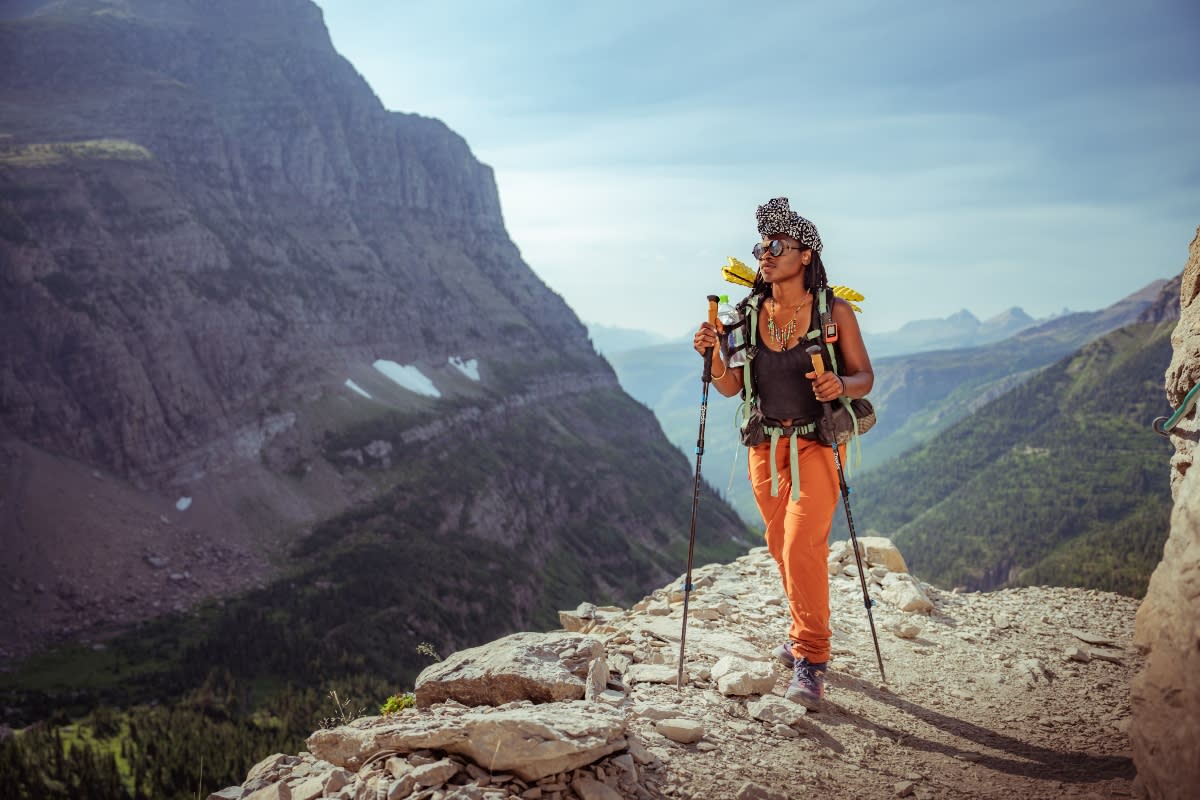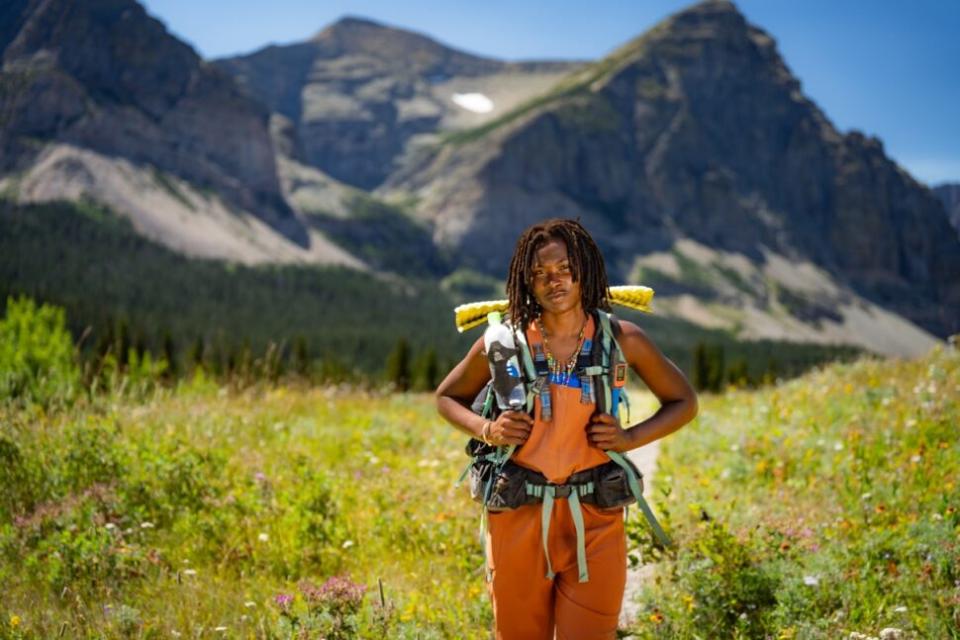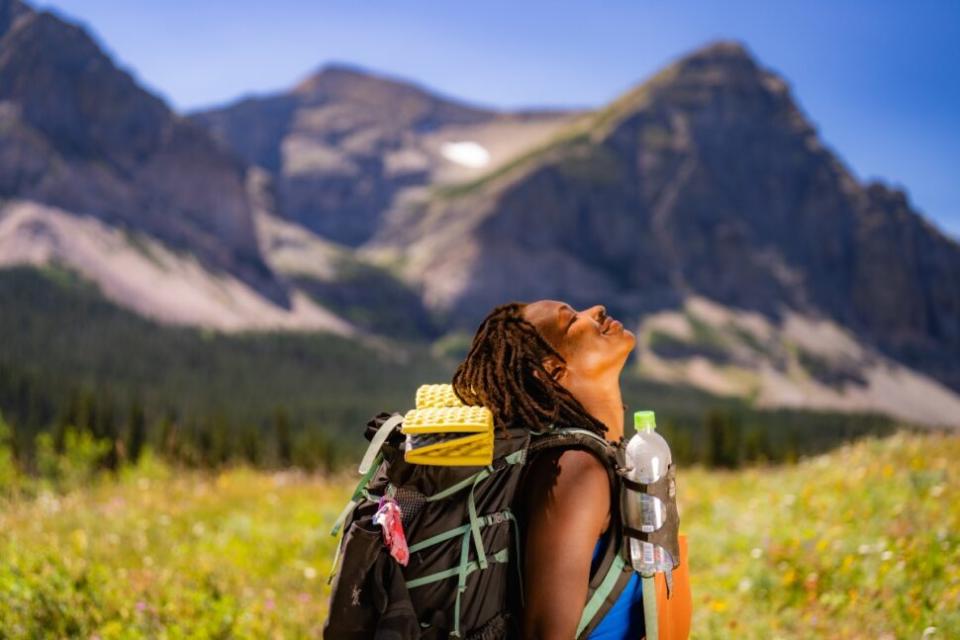Black Queer Author Shilletha Curtis Chronicles Her Transformative Hike Along The Appalachian Trail In New Book

The stories of those who have overcome tremendous odds and still radiate positivity continue to be inspiring and uplifting. One such person is Shilletha Curtis. Shilletha Curtis, also known as “Dragonsky,” was born in Newark, New Jersey. Curtis’ upbringing was marked by adversity, including fractured family dynamics, bullying, and abuse. However, despite these challenges, her unwavering spirit and passion for helping others shine through.
When the COVID-19 outbreak forced Curtis out of her position as a veterinary technician, she set out on the Appalachian Trail. This journey would change her life. In her riveting autobiography “Pack Light,” Curtis chronicles her transformative experience through the Appalachian Trail. Along this trek, she confronts her childhood trauma while battling depression, anxiety, and PTSD. Through her raw and inspiring narrative, Curtis challenges stereotypes and showcases the healing power of nature.
More About the Memoir

“Pack Light” is more than just a hiking story. It’s a moving illustration of how nature can improve lives and how strong the human spirit can be. Curtis’ voyage questions the traditional interpretation of hiking while Black who argues that nature is a universal heritage. She takes readers on a journey of self-exploration, healing, and empowerment through her poetic imagery and deeply reflective words. Curtis’ experiences resonate with authenticity, offering hope and inspiration to anyone facing their own challenges. Experience her life story and the highs and lows she faced in this interview with Travel Noire.
TN: Can you share a bit about what life was like growing up in Newark and how those experiences influenced your decision to hike the Appalachian Trail?
SC: Not having access to nature and not knowing that there was a world that existed outside of Newark influenced my decision to hike the Appalachian Trail. As a kid, I’ve always wanted more because there were not many things to do. The people who we expected to care, like my teachers, didn’t care at all.
Based on this experience, it encouraged my adventurous spirit. I wanted to be free in the sense of being free from poverty, free from the mundane paradigm, and free to write my own story. Being confined led me to this build-up of wanting a release, and I found that in nature. Nature allowed me to take back my narrative because as a child, what I was exposed to, and where I grew up I didn’t have control of that. But as an adult, the power is in my hands to take control of this adventure of freedom.
TN: What was life like after losing your job as a veterinary technician due to the COVID-19 pandemic?
SC: Life after losing my job was very tragic for me. I had spent my life thinking I wanted to be a veterinarian. Having that ripped out from under me brought me down to a mental dark anguish where I thought that being a vet tech was all that I was worth- that’s all I was meant to be. But it was a friend who said to me, “You’re worth is not tied up to your job. Your worth is so much more than being a vet tech. That does not define you.”
Hearing that sparked a chain reaction in my brain. Her words motivated me. Also, something inspired me to drive around which allowed me to discover the forest in Harriman State Park. The turning point was feeling lost, confused, and down and taking my friend’s words and turning them into power. When I went to Harriman State Park with an ex-partner we got out of the car and a man showed us the Appalachian Trail which ran from Georgia to Maine. Something about his words compelled me to start it immediately but I learned quickly I didn’t have the right education and training so I went to learn more about it. I took the loss of a job that I deeply loved and was grieving and, while grieving, I found hope.
TN: In “Pack Light,” you discuss battling depression, anxiety, PTSD, and ADHD during your hike. How did you manage these conditions on the trail, and what strategies helped you the most?
SC: I took my medication every day. I also initially thought I could do therapy. Keeping up with therapy was hard, but I discovered in the first week it wasn’t going to work, which caused me to struggle even more. One thing that kept me going was this constant thought that “tomorrow won’t be like this.”
I adopted this motto when I fell on my first day [and] took time to listen to my body, especially when I couldn’t hike at all. I knew that I was in a place in the woods where I felt safe to process things like PTSD because I was by myself processing traumas. In nature, I felt like I could take up space where I necessarily couldn’t do that someplace else. I was able to throw a rock or move my body in ways that provided stimulation. In nature, I felt I could just be and my anxiety was very low. I took up some meditation techniques but my depression was a constant battle.

TN: Your story takes on the hiking while Black narrative. What societal perceptions were challenging on your journey?
SC: I want to take on the biggest societal misconception that Black people don’t hike and don’t want to be in the woods. I hear that a lot coming from white people. It’s not true because historically Black people were withheld and segregated from these things. Especially during Jim Crow and the segregation in parks like Shenandoah National Park, for instance. It’s about being kept out of those places and [the] outdoor industry and nature being gatekept.
Also, it’s not that Black people don’t want to be outside but there’s a lot of fear just in speaking with people from my community. Even when I took off on the AT people told me, “Don’t get lynched.” There’s so much history in the woods and I was scared to give the history and what continues to persist in this country.
If Black people were able to be educated, like at the beginning of my journey, they would have more information. There are access issues and other inequalities for people of color, especially Black people. It’s important to look into Black history and look into why Black people are not in the outdoors and those who are out there aren’t getting enough visibility.
TN: You describe nature as transformative. Can you explain how the environment of the Appalachian Trail contributed to your process of healing and self-discovery?
SC: The Appalachian Trail taught me things I didn’t learn in 32 years of life. There’s still goodness in this dark world. I’ve learned that I’m stronger than I ever knew. Learning to get through some tough things by accepting them and not dwelling on the situation.
The trail has forced me to be present and live in the moment because everything isn’t promised. [It] also taught me to go with the flow. I can let myself be happy; I can be spontaneous. Learning how to accept change because change has been a big trigger for me. But I learned to accept what is and know that I’m no different than another form of life.
TN: As a Black Queer author, how do you feel your identity influenced both your experiences on the trail and the way you wrote about them in the book?
SC: I wrote this book from my experience but also from the experience of being Black and Queer on the trail. Also, I really wanted to be authentic but also for my community and the greater hiking community to show my experience as a Black woman because most people hiking this trail are white.
I remember talking about this on the trail and people would tell me the trees don’t see color or to keep politics off the trail. But I thought, “When will my experience become a topic of politics?” That fueled me a lot. Being a lesbian didn’t really impact my experience because I’m visibly Black but not visibly a lesbian. Blackness is something I can’t hide [and] was more apparent on the trail. Being a triple minority, I felt like I had a duty to tell the truth and not save face, being as true as possible, and sharing a true Black experience.
TN: What do you hope readers take away from your story, especially those who may have faced similar adversities?
SC: I want the readers to know that your mental disorders [or] illnesses do not define you. People invalidating you or telling you experiences don’t define you; just know that the outdoors is for everyone not just for white people because I grew up believing that, too.
I want people to feel inspired that they can hike and have the knowledge and truth to make an informed decision. The ultimate goal is to give hope to those who are struggling with mental illness. You never know what someone is going through. It’s okay not to be okay.
This article has been edited and condensed for length and clarity.

